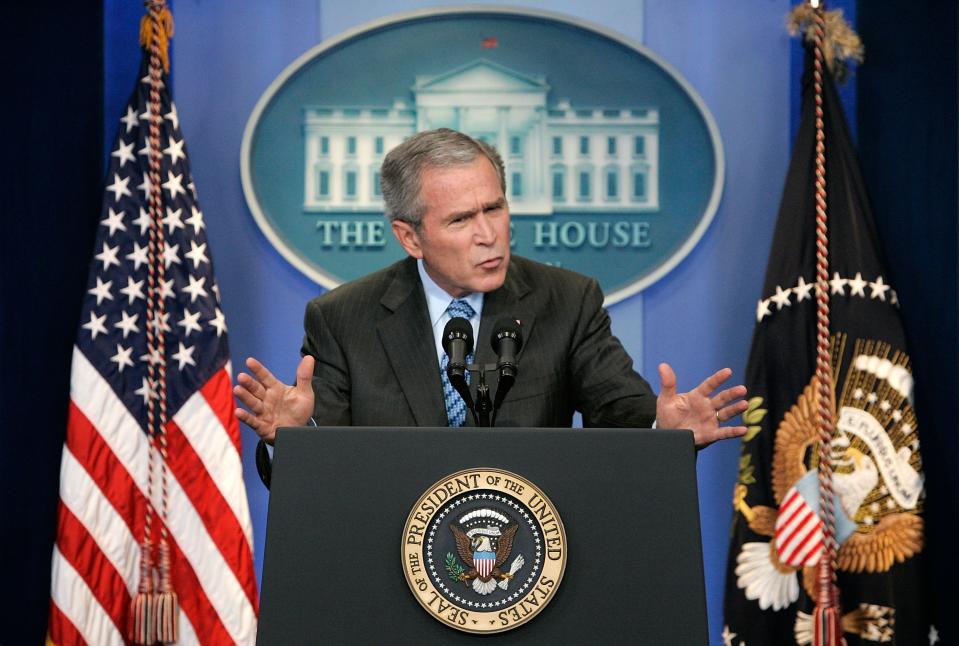In politics, 'honor and dignity' can bring elusive and sometimes unsustainable goals
- Oops!Something went wrong.Please try again later.
- Oops!Something went wrong.Please try again later.
When Texas Gov. George W. Bush was running for president in 2000, one of the threads that tied his campaign together was the promise to "restore honor and dignity to the White House."
The feel-good line, which occasionally subbed "decency" for "dignity," was invoked repeatedly by the candidate, his father, who had been president; his brother who was then-governor of Florida; and his nephew who would later enter politics. It was intended as much as a compliment to George W. Bush as it was a none-too-subtle dig at the Monica Lewinsky sex scandal that dominated headlines in the final three years of Bill Clinton's presidency.
By the time the 2000 presidential campaign was in full swing, Clinton had been accused of having an extramarital affair with a White House intern who was 27 years his junior. Then he lied about having the affair. Then he admitted he lied about having the affair. Then he was impeached for lying under oath about having the affair. And then he was acquitted in a Senate trial after only 55 senators voted to send Clinton packing, well short of the 67 votes needed to oust him.
Along the way, the public heard lurid details of the intern's stained blue dress and graphic descriptions of no fewer than seven clandestine sexual encounters between the president and his subordinate spelled out in the explicit report by special prosecutor Kenneth Starr.

And through it all, many Americans fretted over what their children were hearing each night on the news. CBS News in August 1998 aired a segment called "Explaining Monicagate to Kids" and quoted parents, and some children, about how uncomfortable they were with what was called "all-Monica-all-the-time programming," in reference to the intern.
"I'm embarrassed. I really don't think my children should know stuff like this," one mother said in the report. Another added, "Frankly, I don't let them watch the news."
More: 'Oh my god': Stormy Daniels testifies on spanking Trump, his gold tweezers, and silky PJs
All of this made the "honor and dignity" message from the Bush campaign against Clinton's vice president, Al Gore, all those years ago especially salient. As much as Bush was selling himself as a successful Texas governor and a "compassionate conservative," he was implicitly promising Americans that they need not worry that his presidency would come with a tawdry sideshow that must be shielded from the eyes of impressionable youths.
Last week's testimony from one-time adult film actor Stormy Daniels in the hush money trial of former President Donald Trump might be conjuring up a sense of déjà vu for some Americans old enough to remember the Clinton soap opera. The Trump jury heard salacious and even embarrassing details, which were later carried by all of the national news outlets, about Daniels' version of the 2006 encounter when she was in her late 20s and Trump was 60. It's important to note that Trump has denied he and Daniels had sexual relations.
But missing from this narrative is the "what about the children?!" angst that was a running subtext of the Clinton scandal. Perhaps because the "children" of the last years of the 20th century are the parents of the kids today and Clinton was not the only subject of a political sex scandal during their formative years, none of this surprises the current generation of voters.
Or maybe it's because the thrice-married Trump's reputation as a less-than-faithful husband was well-known long before he ran for office. Even the vulgar audio in the now-infamous "Access Hollywood" tape did not derail Trump's 2016 presidential run, though it did put the candidate on the defensive for a news cycle or two.
More: Monica Lewinsky overcame ‘excruciating shame and pain.’ Now, she’s a voice for anti-bullying.
Trump's four years in the White House were mercurial, to say the least, whether through some of his late-night social media posts or his private-remarks-made-public in which he disparaged Third World countries in profane terms and personally criticized some of his fellow heads of state.
Just as Bush promised a restoration of dignity if he were elected in 2000, so did Joe Biden — 20 years later — in his presidential campaign against Trump. In fact, Biden sometimes used almost the exact phraseology as Bush and his family did. If the outcomes of both elections are any barometer, the message resonated with enough voters to make a difference.
It's probably a safe bet that Biden will again play the "honor and dignity" card against Trump as the 2024 campaign barrels toward November. But whether that carries the same heft as it has in the past remains uncertain. The bar for shocking our sensibilities seems much higher now than it was a just a quarter-century ago.
This article originally appeared on Austin American-Statesman: How sex, honor and dignity factor into presidential elections

